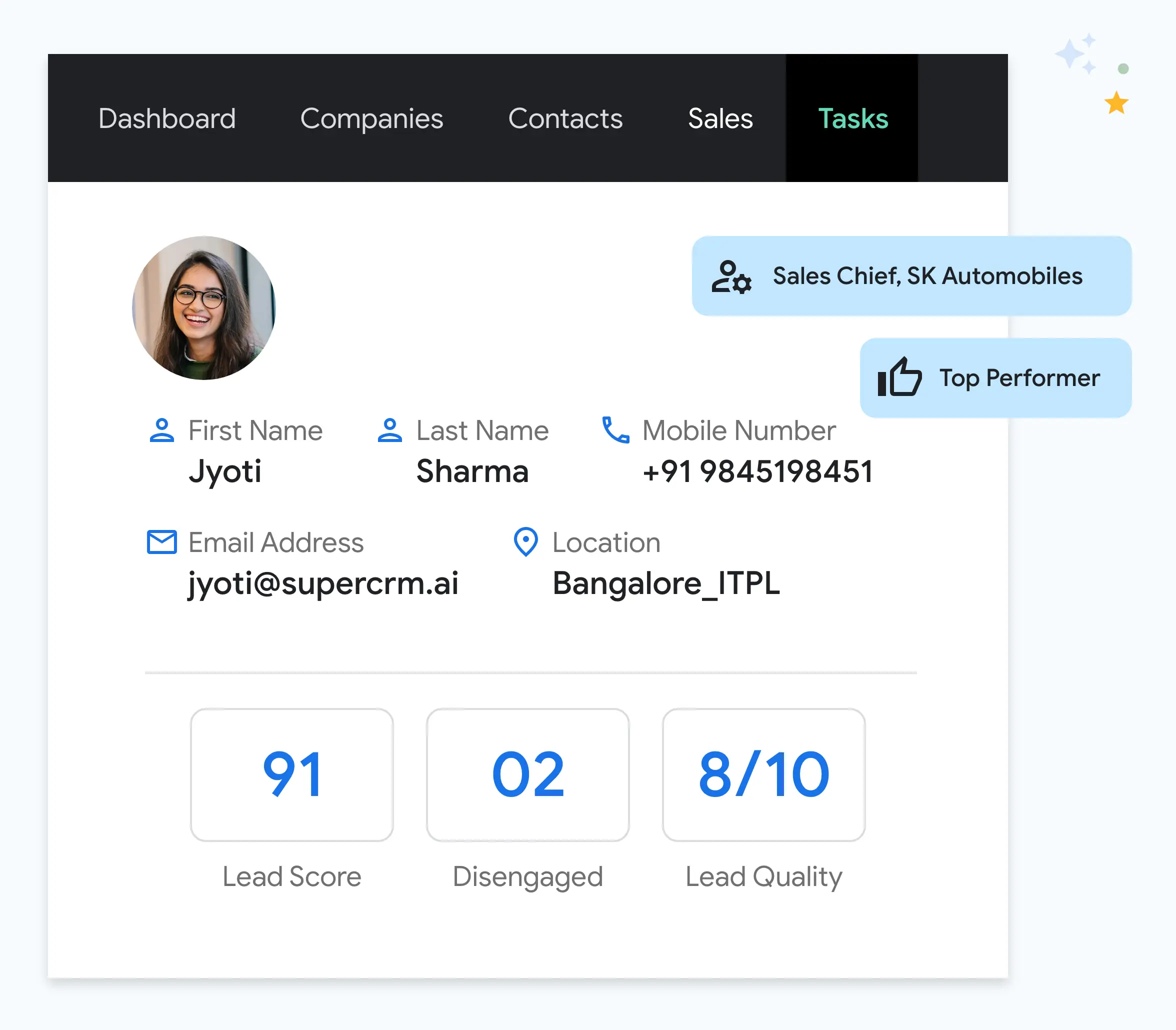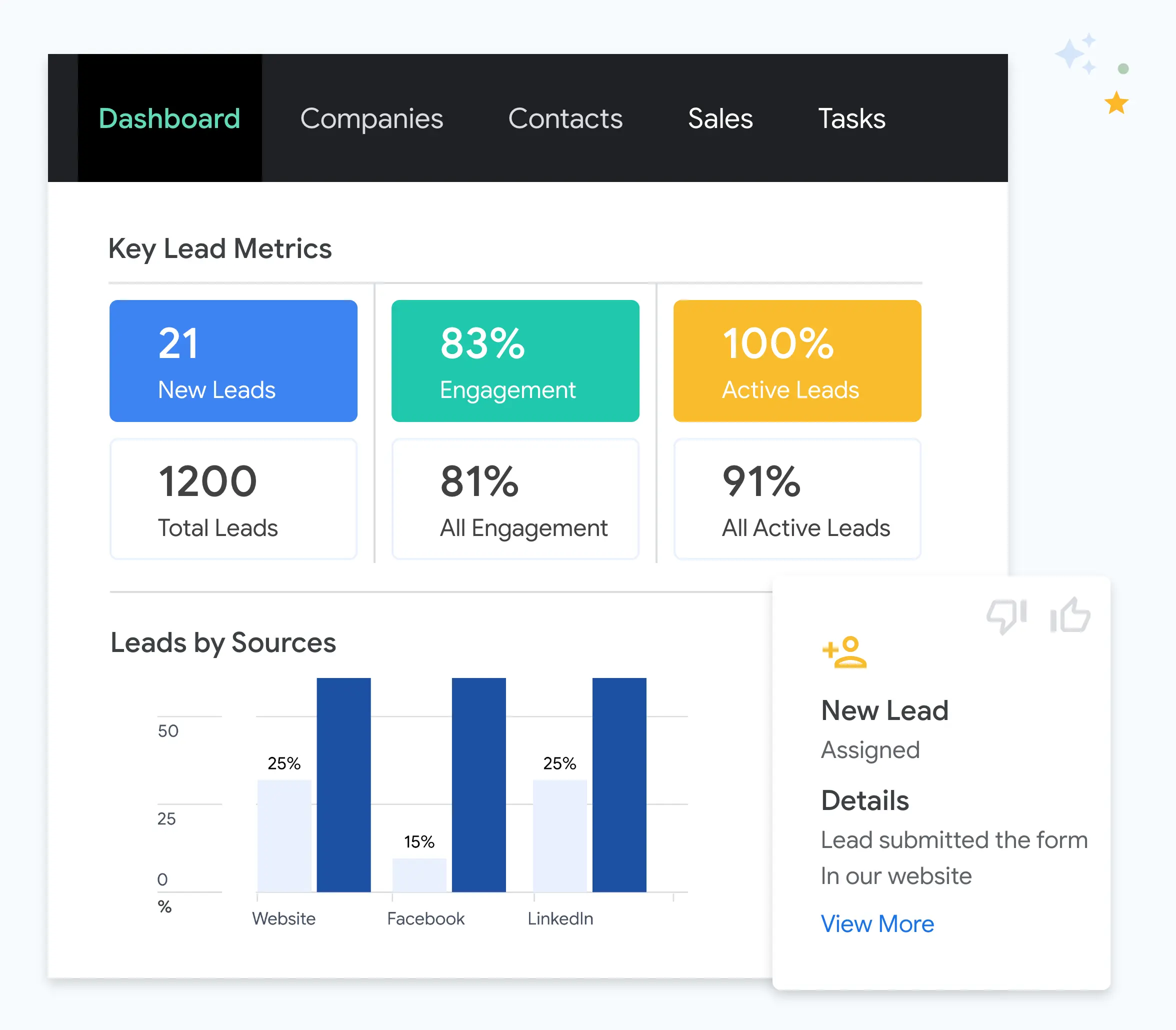Why Software company firms need a CRM?
For proficient software consultants, seizing these opportunities and offering top-notch solutions is essential. A reliable and practical CRM is a powerful tool for attracting clients, as it keeps information organized and ensures that you and your clients only see what is relevant. This organization not only aids in winning more clients but also contributes to long-term client retention.
Navigating the Clients Module
Explore the significance of efficiently managing your client base with SuperCRM's Clients module
Company Collaboration
Business collaborations are seamless by allowing you to partner with companies instead of just individuals.
Product Catalog
Discover the simplicity of maintaining a comprehensive catalog of your products and services
Task Management
Dive into the Activities feature of SuperCRM, where you can set up tasks, schedule events, make client calls
Opportunities Tracking
Clients module goes beyond storing contact information by facilitating close monitoring of client opportunities
Communication Hub
Uncover the capabilities of SuperCRM in terms of communication. From making client calls to scheduling video calls and meetings

Brilliant Pipeline for Tracking Deals
- Lead Qualification: Identify and assess potential leads efficiently.
- Requirements Gathering: Streamline the process of collecting and understanding client needs.
- Closing and Payment: Ensure a smooth transition from project completion to receiving payment.
- Adaptability: Tailor the pipeline stages to align with the unique processes of your business.
- Flexibility: Easily modify the pipeline to accommodate variations in deal structures and workflows.
- Scalability: Scale the pipeline to handle deals of different sizes and complexities.

Carefully Customized Fields for Detailed Information
- Contextual Details: Include fields for nuanced information to provide comprehensive context.
- Client Insights: Capture details crucial for understanding client preferences and history.
- Project Specifics: Store information essential for project management and successful execution.
- Industry Research: Studied operational patterns of IT and software consulting firms.
- Best Practices: Incorporated successful strategies into SuperCRM for optimal deal management.
- Efficiency Enhancement: Streamlined data input based on insights from successful firms.
- User-Friendly Interface: Simplify the process of adding information to SuperCRM.
- Full Context Assurance: Ensure every data entry has the necessary context for all stakeholders.
- Project Transparency: Facilitate clear communication and understanding between you, your client, and the project team.
You’re gonna love us forever.

Have any thought find here.
Don’t find your answer here? just send us a message for help
Contact us

CRM, or Customer Relationship Management, stands at the core of IT consultancy, serving as a pivotal set of tools and strategies to manage client interactions and enhance relationships. For IT consultancy firms, SuperCRM and similar solutions offer a centralized platform to organize diverse client information. This includes data such as project requirements, preferences, and communication history, providing a comprehensive view that enables efficient collaboration among different departments.
- Enhanced Customer Understanding: IT consultancy relies on understanding client needs thoroughly. CRM facilitates a complete view of clients, allowing personalized communication and targeted offerings based on preferences and requirements.
- Time and Resource Savings: Automation features within CRMs like SuperCRM streamline processes such as email communication and customer record management, saving valuable time and resources for IT consultancy teams.
- Data-Driven Decision Making: Analysis and tracking tools provided by CRMs empower IT consultancy businesses to measure the effectiveness of marketing and sales campaigns. This data-driven approach aids in informed decision-making for the future of the consultancy.
In the realm of IT consultancy, a CRM operates by aggregating all client information into a centralized database accessible to the entire company team. This database encompasses diverse data points like demographic information, project history, social interactions, emails, and phone calls. This compilation of information allows IT consultancy firms to create and analyze detailed customer profiles, subsequently informing and improving their customer service strategy.
- Comprehensive Customer Profiles: IT consultancy deals with intricate projects, and CRM's ability to create detailed customer profiles assists in tailoring services to specific client needs.
- Informed Customer Service Strategy: The analysis of customer data within a CRM is crucial for IT consultancy firms to refine and enhance their customer service strategies continuously.
- Collaborative Decision-Making: A centralized CRM database fosters collaboration among team members in IT consultancy, ensuring everyone has access to up-to-date client information for effective decision-making.
The implementation of CRM in an IT consultancy business yields numerous benefits, aligning with the dynamic nature of the industry.
- Automation for Efficiency: CRMs automate information collection, sales processes, and generate key reports, promoting efficiency in IT consultancy operations.
- Scalability for Growth: CRM integration allows IT consultancy businesses to scale exponentially, accommodating an increasing client base and complex projects.
- Customer-Centric Approach: By attracting more and better prospects and improving customer service, CRMs contribute to IT consultancy firms' reputation for a customer-centric approach.
Choosing a CRM for an IT consultancy involves assessing specific needs, considering the sector's unique requirements, project complexity, and budget constraints. While SuperCRM is tailored for IT consultancy, universal steps can guide the selection process.
- Tailoring to Business Processes: The chosen CRM should align closely with IT consultancy business processes, ensuring seamless integration into existing workflows.
- Universal Guide for Selection: Companies can follow a universal guide, considering size, sector, and budget, to navigate the CRM purchasing process effectively.
- Use Cases for IT Consultancy: IT consultancy firms should explore SuperCRM's use cases for their industry, ensuring it caters to their unique requirements and challenges.
After implementing a CRM strategy, measuring its success is crucial for IT consultancy firms to ensure optimal performance and make necessary adjustments.
- Client Retention and Satisfaction: Key performance indicators (KPIs) for IT consultancy include increased customer retention, improved satisfaction, and reduced problem resolution time.
- Sales Growth: Monitoring an increase in sales is vital for IT consultancy, indicating the effectiveness of CRM strategies in attracting and retaining clients.
- Regular Adjustment for Success: Regular tracking and adjustment of specific and measurable goals ensure that the CRM strategy aligns with the evolving needs of IT consultancy businesses.
Integration of CRM with other tools and systems is paramount for enhancing efficiency and productivity within IT consultancy.
- Tool Compatibility Assessment: IT consultancy firms should identify tools they use and explore CRM integrations, enhancing communication between teams and systems.
- Optimizing Customer Information: Integrating CRM with tools like marketing automation (e.g., SuperCRM) improves personalization, synchronizes contact data, and provides a centralized location for customer information.
- Long-Term Efficiency Gains: Although integrating tools and systems may require initial investment, the long-term benefits include improved efficiency, productivity, and an enhanced customer experience for IT consultancy businesses.


